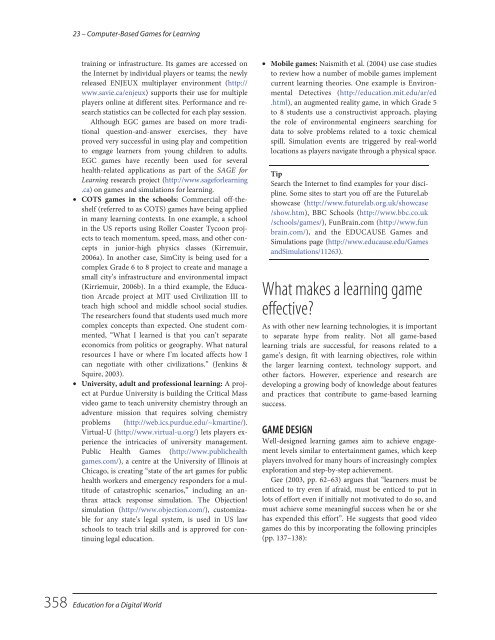Education for a Digital World Advice, Guidelines and Effective Practice from Around Globe, 2008a
Education for a Digital World Advice, Guidelines and Effective Practice from Around Globe, 2008a
Education for a Digital World Advice, Guidelines and Effective Practice from Around Globe, 2008a
Create successful ePaper yourself
Turn your PDF publications into a flip-book with our unique Google optimized e-Paper software.
23 – Computer-Based Games <strong>for</strong> Learning<br />
training or infrastructure. Its games are accessed on<br />
the Internet by individual players or teams; the newly<br />
released ENJEUX multiplayer environment (http://<br />
www.savie.ca/enjeux) supports their use <strong>for</strong> multiple<br />
players online at different sites. Per<strong>for</strong>mance <strong>and</strong> research<br />
statistics can be collected <strong>for</strong> each play session.<br />
Although EGC games are based on more traditional<br />
question-<strong>and</strong>-answer exercises, they have<br />
proved very successful in using play <strong>and</strong> competition<br />
to engage learners <strong>from</strong> young children to adults.<br />
EGC games have recently been used <strong>for</strong> several<br />
health-related applications as part of the SAGE <strong>for</strong><br />
Learning research project (http://www.sage<strong>for</strong>learning<br />
.ca) on games <strong>and</strong> simulations <strong>for</strong> learning.<br />
• COTS games in the schools: Commercial off-theshelf<br />
(referred to as COTS) games have being applied<br />
in many learning contexts. In one example, a school<br />
in the US reports using Roller Coaster Tycoon projects<br />
to teach momentum, speed, mass, <strong>and</strong> other concepts<br />
in junior-high physics classes (Kirremuir,<br />
2006a). In another case, SimCity is being used <strong>for</strong> a<br />
complex Grade 6 to 8 project to create <strong>and</strong> manage a<br />
small city’s infrastructure <strong>and</strong> environmental impact<br />
(Kirriemuir, 2006b). In a third example, the <strong>Education</strong><br />
Arcade project at MIT used Civilization III to<br />
teach high school <strong>and</strong> middle school social studies.<br />
The researchers found that students used much more<br />
complex concepts than expected. One student commented,<br />
“What I learned is that you can’t separate<br />
economics <strong>from</strong> politics or geography. What natural<br />
resources I have or where I’m located affects how I<br />
can negotiate with other civilizations.” (Jenkins &<br />
Squire, 2003).<br />
• University, adult <strong>and</strong> professional learning: A project<br />
at Purdue University is building the Critical Mass<br />
video game to teach university chemistry through an<br />
adventure mission that requires solving chemistry<br />
problems (http://web.ics.purdue.edu/~kmartine/).<br />
Virtual-U (http://www.virtual-u.org/) lets players experience<br />
the intricacies of university management.<br />
Public Health Games (http://www.publichealth<br />
games.com/), a centre at the University of Illinois at<br />
Chicago, is creating “state of the art games <strong>for</strong> public<br />
health workers <strong>and</strong> emergency responders <strong>for</strong> a multitude<br />
of catastrophic scenarios,” including an anthrax<br />
attack response simulation. The Objection!<br />
simulation (http://www.objection.com/), customizable<br />
<strong>for</strong> any state’s legal system, is used in US law<br />
schools to teach trial skills <strong>and</strong> is approved <strong>for</strong> continuing<br />
legal education.<br />
• Mobile games: Naismith et al. (2004) use case studies<br />
to review how a number of mobile games implement<br />
current learning theories. One example is Environmental<br />
Detectives (http://education.mit.edu/ar/ed<br />
.html), an augmented reality game, in which Grade 5<br />
to 8 students use a constructivist approach, playing<br />
the role of environmental engineers searching <strong>for</strong><br />
data to solve problems related to a toxic chemical<br />
spill. Simulation events are triggered by real-world<br />
locations as players navigate through a physical space.<br />
Tip<br />
Search the Internet to find examples <strong>for</strong> your discipline.<br />
Some sites to start you off are the FutureLab<br />
showcase (http://www.futurelab.org.uk/showcase<br />
/show.htm), BBC Schools (http://www.bbc.co.uk<br />
/schools/games/), FunBrain.com (http://www.fun<br />
brain.com/), <strong>and</strong> the EDUCAUSE Games <strong>and</strong><br />
Simulations page (http://www.educause.edu/Games<br />
<strong>and</strong>Simulations/11263).<br />
What makes a learning game<br />
effective?<br />
As with other new learning technologies, it is important<br />
to separate hype <strong>from</strong> reality. Not all game-based<br />
learning trials are successful, <strong>for</strong> reasons related to a<br />
game’s design, fit with learning objectives, role within<br />
the larger learning context, technology support, <strong>and</strong><br />
other factors. However, experience <strong>and</strong> research are<br />
developing a growing body of knowledge about features<br />
<strong>and</strong> practices that contribute to game-based learning<br />
success.<br />
GAME DESIGN<br />
Well-designed learning games aim to achieve engagement<br />
levels similar to entertainment games, which keep<br />
players involved <strong>for</strong> many hours of increasingly complex<br />
exploration <strong>and</strong> step-by-step achievement.<br />
Gee (2003, pp. 62–63) argues that “learners must be<br />
enticed to try even if afraid, must be enticed to put in<br />
lots of ef<strong>for</strong>t even if initially not motivated to do so, <strong>and</strong><br />
must achieve some meaningful success when he or she<br />
has expended this ef<strong>for</strong>t”. He suggests that good video<br />
games do this by incorporating the following principles<br />
(pp. 137–138):<br />
358 <strong>Education</strong> <strong>for</strong> a <strong>Digital</strong> <strong>World</strong>


















